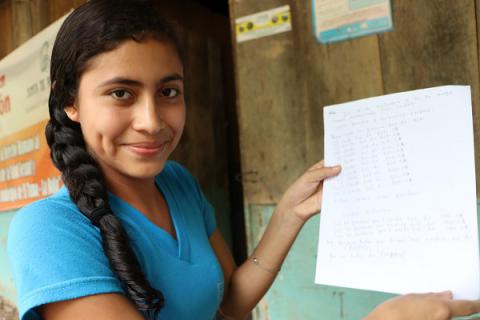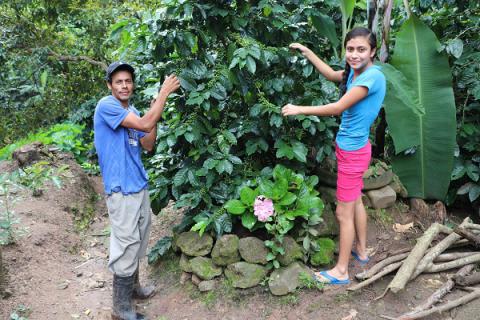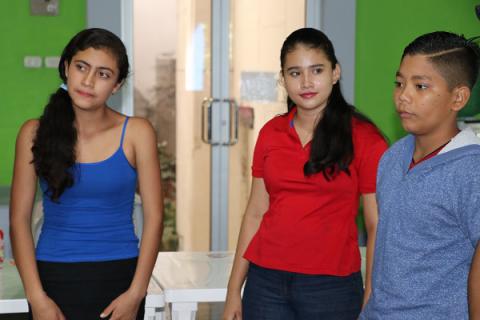 Nicaragua
Nicaragua
Languages
The most important thing: study and get ahead
In a wooden house surrounded by flowers and coffee plants, Martha Eloísa Martínez Gutiérrez is waiting for us. Martha, who only just turned 15 on June 24th, is one of 535 adolescents and young women and men from the Jinotega and Matagalpa departments who are taking part in the “Cup of Excellence with Young Entrepreneurs” project that is being promoted by Save the Children, with financing from the Keurig Green Mountain-Judith Haskell Brewer Fund and the Bezos Foundation.
Martha, who is one of the youngest participants, joined the project when it was just starting in September 2016, when she was only 14. “From the pig business, the pork roast and pork rind sell the most,” she explains, while telling us that she has learned to prepare and fry pork rind thanks to this initiative. Martha, together with her cousin and partner Yerling, who just turned 17, have been moving ahead with their pig butchering business, in the San Francisco de Peñas Blancas community, located in the El Tuma La Dalia Municipality, some 200 kilometers from Managua. In this community, groups of adolescents and young people and learning processes are facilitated by our partner called ODESAR (Organization for economic and social development for the urban and rural area).

“It’s going well, we sell everything, we only sell on credit to those we know well, and they pay us when they get their 2-week salary,” she tells us. Although there are other people in the community who butcher pigs, they have been able to sell 15 pigs to date: the first two were bought with project funding, and the others with the earnings they have been getting from sales. The last two pigs they slaughtered cost C$2,000 and C$4,000, from which they obtained C$310 and C$600 in earnings, respectively. Martha shows us the books, which detail what they’ve invested, their indirect costs, and the final profit they have made. She proudly affirms that everything needs to be clearly registered.
They have hardly had any problems with their butchering business. “One time a few pounds of meat were left over, and we had to go sell it at the San Francisco Hacienda. They bought it right away, so it wasn’t a problem.” As we talk more, she explains that finding pigs to butcher is a little complicated, because there aren’t many in the community. “My father helps us look for them.” Bernardino Martínez, her father, helps with this task and the keeping the books on their sales. “I go to Waslala for the pigs, I help Martha and Yerling in this way because it could be dangerous for them to go alone with all that money for buying the pigs, and because they look young,” comments don Bernardino. He also explains that he has experience in butchering, so he has taught them how it should be done, and what things to consider when they are negotiating the price of the pigs.
It’s important for mothers and fathers to accompany young people in this process of empowerment, they always need this type of guidance,” comments Fredy Alvarenga, the technician from the Child Poverty program that monitors the “Cup of Excellence with Young Entrepreneurs” project. “The family’s involvement is one of the things we are promoting, and with don Bernardino it is clearly taking place.”
Martha and her partner have reinvested more than C$14,000.00 to continue buying pigs, and they buy at least two at a time for butchering. They’ve bought a table for organizing the cuts, and would like to improve the conditions of the butchering area. They are also thinking of possibly producing by-products. “Martha and her mother are already thinking about making nacatamales, since they already have the meat. This Saturday we’re going to butcher a pig and prepare 100 nacatamales,” explains don Bernardino, pointing out that they are thinking of ways to generate more earnings than those they already have “pre-sold.” In another conversation, Martha commented that they might sell cuajada (farmer’s cheese), during times when they don’t find pigs to buy. They are even thinking of opening a little store in the house, since it is located right on a main street. “One week I can run it and the other week my partner. I think a store could do well here, since I am always at home.”
Martha happily tells us about her business’s progress. It has only been going for 7 months, and she talks about the training and empowerment, and speaks openly about how she feels and about what she’s learned. “I love doing this, we are known in the community, and people ask us about the business and are always awaiting the next time we butcher a pig.” Although they are in a “down time” right now, when there is no work on the coffee farms, they’ve had good sales. “We have been butchering every 8 days, and I’ve taught Yerling how to do it. At the beginning we thought we would only do it every 15 days,” comments don Bernardino. Martha explains that they are going to continue reinvesting their earnings from butchering pigs. Her partner is going to use his earnings to help his mother buy food for their family, while Martha speaks about using her earnings for her studies.
A calm life of studying and helping her family

“For me, the most important things are my family, studying and getting ahead,” Martha tells us. This young woman lives with father, her mother, two younger sisters and a younger brother. At home, she helps with cleaning, and when her father and mother aren’t home, she does the cooking at takes care of her sisters and brother. “During the coffee harvest, I go with my father to work and my mother stays at home.”
Martha is in her third year of high school, studying at the La Mora School on Saturdays, because “the regular program is more expensive, because of transportation costs,” she explains. “I’ve always liked to study and I’ve always wanted to continue my studies. When I was in primary school, I wanted to go to secondary school, and now I want to go to the university.” This adolescent tells us that she is doing well at school, and that she behaves well and does her homework. “I got excellent grades last year. I still don’t know about this semester because we haven’t gotten our grades yet.”
Martha loves to study language and literature, natural sciences, history, social sciences and also mathematics. “Although math is difficult, you can learn if you put your mind to it.” English is the subject that is hardest for her. “When I finish high school, I want to study agronomy. I also thought about studying to be a teacher, but I like agronomy because we grow coffee at home. I’ve always worked with my father, and I grew up with coffee.”
She is thinking about studying at the National Agrarian University (UNA), and will have to move to Matagalpa. Although she still has a couple of years before that happens, she’s very clear about what she wants to do. Martha hopes she will pass each grade and be able to save everything she can to cover her university costs. “If I don’t pass the admission test to get into the UNA, which is free, things might get complicated. I will have to look for a job to cover the tuition of a private university, or if the business does well, use the earnings for my education.”
Time for recreation as well
When we speak with Martha about her hobbies, and she tells us that when her homework is done, she likes to draw, write, watch the soap opera on TV, and that in previous years she took part in the Network of Reading Promoters, which was supported by CESESMA and Save the Children. She still has a box filled with books that she uses now and then to motivate children in the community to read.
Martha takes part in the Consultative and Mobilizing Group promoted by Save the Children in La Dalia. It is a group of 25 children and adolescents from El Cuá, Jinotega, Rancho Grande and La Dalia, which receives training about different topics and is developing activities aimed at reaching every single boy and girl in the area. In April, they met to talk about children’s rights and creativity, and decided to organize an activity with the children in the San Luis School. “I’ve become aware of everything that Save the Children does to promote children’s rights, and realize how much I have learned about human rights. The campaign centers on promoting child and adolescent rights, and eradicating violence and poverty.” Thus, Martha is adding her leadership and skills to Save the Children’s global campaign, “Every Last Child,” and she clearly sees the connection between this participation and the training courses she is receiving as part of the project.

Promoter of a group of 10 young people
Martha not only manages her pig butchering business, but also works as a promoter, along with another teenager. They both coordinate a group of 10 adolescents and young people in San Francisco de Peñas Blancas. “They picked me because I’m very responsible and never miss the meetings. There might be some people who talk more, but I also participate.”
Martha coordinates the meetings where the business initiatives being pursued by young people in the San Francisco de Peñas Blancas group are reviewed. Within this group, in addition to the pig butchering business of Martha and her partner, there is also an initiative underway to raise broiler chickens, and another group is looking into building a bread oven (they took part in a workshop on bread making in Matagalpa, “so they’ve already received training.”).
This group is where Martha replicates the training she receives. As the promoter, she provides training about different topics, and when group members ask her questions, she is able to help work out any doubts. She says that the young people in her group listen attentively during these workshops. “I feel good. Being a promoter has helped me to overcome my fear about speaking in public, and I’ve improved a lot. Now I participate more in class. The project has helped me this way.” Martha comments that when they do work in class, she saves the materials and uses the knowledge she’s acquired in training sessions. “This is what I do with a brochure on coffee management that I received during one of the project field visits. I used it with my classmates, and we presented it in the group.”
Ongoing training
In the training she has received as a promoter, she has learned about children’s rights, gender equality, the origin and history of coffee, as well as techniques for improving crop quality and yields. “I learned about some rights that I didn’t know about before. I was surprised to hear about masculinity, about how all people should be respected equally, also women. I also learned about how to run the groups,” Martha affirms, and she explains that she uses the dynamics and games she has been learning to work with her group. “They like it, they have fun.”
A few weeks ago, they attended a workshop about savings and credit with the lending institution FDL and with the Bancentro bank. Ever since then, she and her partner have been thinking about how to open a savings account in the bank. “Because of my age, I don’t have an identity card, which means I can’t have a bank account, so we’re thinking of opening one in my father’s name until I’m 16 years old.”
Martha visited in the Farm School of the El Recreo Café, located on the highway between Jinotega and El Cuá, where they talked about how to manage coffee crops, how to classify beans, the types of plants and their differences. “When I returned home, I talked with my father about different types of coffee and how organic fertilizer can benefit our crop, because this is what we live on, our coffee crop.” Don Bernardino smiles proudly while Martha explains the way that shade needs to be regulated, in order to insure good coffee production.
There has definitely been a “before” and an “after” in the life of Martha. We are reminded that the goal of the “Cup of Excellence with Young Entrepreneurs” project is precisely supporting adolescents and young people in developing their own businesses and improving their skills, so that their businesses operate effectively. Martha is making this happen, and she is only 15 years old.